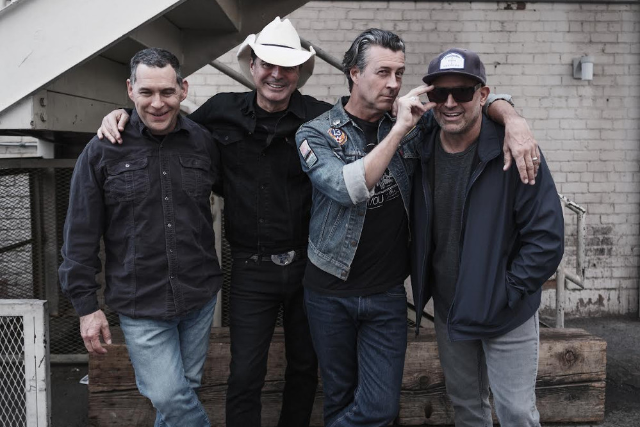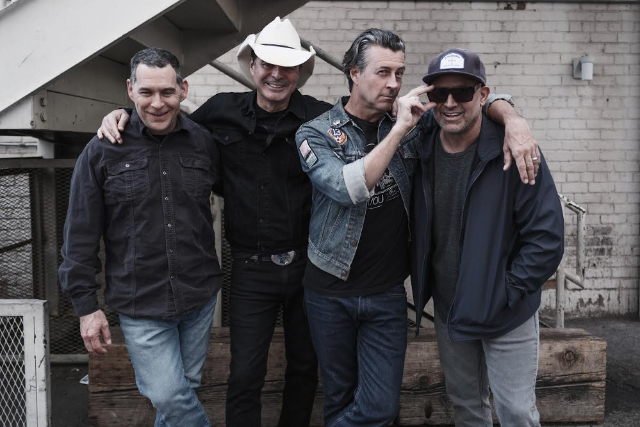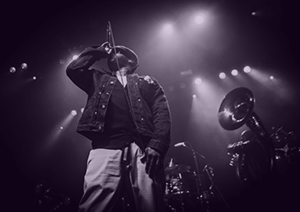Ticket Price: $25 advanced / $28 day of show / $44 reserved loft seating (available over the phone 858-481-8140 or in person at our box office) (seating chart / virtual venue tour)
Not on the e-mail list for Venue Presales? Sign Up to be a Belly Up VIP and you will never miss a chance to grab tickets before they go on sale to the general public again!
There are No Refunds or Exchanges on tickets once purchased.
All Times and Supporting Acts are subject to change.


Hailed as one of the most exciting live acts on the road today, Roger Clyne & The Peacemakers are musical beacons of the Southwest fueled by witty and insightful lyrics, crunching guitar riffs, a dynamic rhythm section and tequila. RCPM are the only act to release seven consecutive studio albums to land on the top 10 of Billboard’s Internet Sales Chart, two at No. 1, all released on a 100% independent record label.
Dubbed the “Springsteen of the Southwest” by the Asbury Park Press, Roger Clyne and his guitar have toured around the world over his 20-year career, starting with The Refreshments. The seminal Tempe, Arizona band made big waves in the ’90s both on college and alternative rock radio as well as MTV with the songs “Banditos” (with the infamous chorus, “Everybody knows that the world is full of stupid people”) and “Down Together” as well as writing the theme for TV’s “King of the Hill.”
More than 20 years later, Clyne and Refreshments drummer PH Naffah, along with bassist Nick Scropos and lead guitarist Jim Dalton keep the songs of The Refreshments alive, while adding to their own ever growing musical legacy. RCPM’s latest album is, Native Heart, and marks the 10th studio album released by Roger Clyne & PH Naffah.
A testament to their growing and extremely loyal fan base is the band’s annual music festival in Rocky Point, Mexico, called Circus Mexicus. What began as a rooftop show thrown together with extension cords and wooden pallets more than 15 years ago has blossomed into a pilgrimage that draws thousands of fans to the once sleepy fishing village. In 2014, fans from 43 states and 7 countries represented at Circus Mexicus.
Clyne not only sings about life in the border-lands, he also produces his own private label top shelf tequila called Mexican Moonshine. From Gold medals in the San Francisco World Spirits Competition to Gold Ribbons from Tequila Aficionado’s Brands of Promise, accolades have been rolling in. And a bottle of Mexican Moonshine Tequila made a well received “guest appearance” on the Rachel Ray Show.
In 2016, Clyne’s career came full circle as Roger Clyne & The Peacemakers celebrated the 20th anniversary of The Refreshments cult classic debut album, “Fizzy Fuzzy Big & Buzzy,” with a residency at the Yucca Tap Room in their hometown of Tempe, followed by a nationwide tour.

Drive It Like It’s Stolen is just as earnest and heartfelt, raw and real as anything he’s ever written before. Yet there’s also a subtle yet significant difference—here he’s delving into a more fictional type of storytelling to create what he terms "post-apocalyptic Americana.” That’s clear from the title of this album’s haunting and ominous opening song, “Cheap Seats (New Year’s Day, NYC, 2042)”. Set two decades in the future, it’s obviously not about anything that’s actually happened, but is still very much inspired by life. At the start of 2022, Hause was in a good place. He’d changed his diet and had maintained a strenuous workout regimen resulting in improved physical and mental health. Feeling great, he’d decided to go off Lexapro and left to go out on the Blood Harmony band touring.
“I was feeling great,” he recalls. “I came back to work, didn’t have my meds. But then I’m on tour, I’m not working out, I’m not eating that way anymore. And I’m really faced with the American city, the American experiment post-pandemic. We’re going places and being like, ‘Oh, my God, this is what Portland and San Francisco and Los Angeles look like.’ And it looked terrifying. Whenever I went anywhere, I felt like I was watching the prequel to 12 Monkeys, except I was also living it and just wondering what the fuck was going on. The tour was doing well, but it just felt like my mental health was falling down stairs. A few months later, when we were finishing the tour, we heard stories that people were siphoning gas out of tour buses. So, a lot of the record was kind of born of and trying to wrestle with that.”
To that extent, the future dystopia of “Cheap Seats” is very real—a vivid depiction of a society on the verge of collapse based on Hause’s experience as a touring musician and then filtered through his imagination. If “Cheap Seats” sets the tone with its dream of escape from a ravaged New York City, then song “Pedal Down” starts that road trip. It’s a gloomy, glowering, dark early morning ride through desolate, post-apocalyptic streets, whose atmosphere really places you inside that car. A moody and monochrome song full of portent and hope in equal measure, it’s both a literal journey—captured by the album’s striking cover, which replicates the view of one of his twins in the back seat as the family drives away—and a metaphorical exploration of Hause’s fears and anxiety of being a parent in modern day America. ‘But we lead our lambs to slaughter,” he sings. ‘It’s profit, boot straps, and guns/Every god needs a sacrifice/Honey, what have we done?’ On one level it’s a simple question directed at his wife about having kids. On another, it’s tackling the whole American system.
“Having children sounds like a great idea,” he explains, “and then you realize that they’re grist for the mill. They’re grist to be sold to, they’re to be exploited, and they’re potentially fodder for our passion for guns. If your god in America is the gun, the idea that we must have these guns, then gods need sacrifices and our children are those sacrifices. And you wonder, ‘Did we bring children in this world to sacrifice them to the various American gods?’ That’s another thing we’re kind of grieving. We’re all complicit in this, and we’re all potentially going to have to pay.”
The disturbing, apocalyptic quasi-reality of the album’s lyrics is matched and amplified by the music. Written by Hause with his younger brother Tim, Drive It Like It’s Stolen—just like the three that preceded it, as well as Tim’s 2022 debut full-length—is the distinct next phase of their creative partnership. The third release on the brothers’ own Blood Harmony record label, it shakes up expectations while at the same time building off the sound and reputation Hause has established for himself over the past decade or so. “Damn Personal”, for example, is a boisterous blue collar anthem about lost friends that’s charged with electric emotion, while the uplifting, Petty-esque “Hazard Lights” ruminates on Hause’s sobriety and the temptation that exists when he’s around friends who still imbibe. Yet though there’s a specificity to those lyrics, they’re easily applicable to other situations, too.
“That feeling of having the hazard lights on,” says Hause, “it’s just uncertainty. I’m kind of just pulled over here—I don’t know where I’m going, I know where I’ve been, the hazard lights are blinking, so please don’t hit me because I’ve got to figure out what to do next.”
Elsewhere, there’s “chainsaweyes” and “lashingout”, two very halves of the same whole that once again merge personal anxieties with universal horrors. Both ask important questions about identity and parenthood and responsibility and the difficulties of raising children in America. The former is backed by dramatic strings that emphasize the importance of the subject matter, while the latter begins as a beautifully poignant acoustic tune before descending into a marvelously unexpected piano breakdown that wouldn’t be out of place in a saloon sometime in the 1800s. Don’t be deceived by what Hause calls the “sugar” of that part, though—there’s still an important message underpinning it.
“Both those songs are trying to assess that angry, always devouring, youthful, testosterone-fueled American boy thing,” explains Hause. “Raising boys in America, you don’t want to fall on the wrong side of history with that. In “lashingout”, that person who sings ‘I want to be God for a day’ at the end could be a school shooter. That wish could be something that would prompt someone to do something terrible. Why would you want that power? You could really hurt people. But here’s the thing—we all feel like lashing out like that at points. But what is it that’s prompting this feeling that you want to change everything, and do you have it right? Are you righteous in that anger of wanting to lash out?”
Drive It Like It’s Stolen was engineered and mixed by David Axelrod, and—like Blood Harmony—produced by Will Hoge and recorded at Santi Sound in Nashville, though with a different set of musicians than that album’s all-star cast. Yet that’s not to the record’s detriment at all. On penultimate song “Tarnish”, a song about both a life lived and one still being lived—past and present coalescing in a beautiful mesh of wistful self-reflection, Hause sings ‘I never got a golden record/I guess the melodies were wrong.’ The performance and production of not just that song, but this whole record, proves that sentiment entirely wrong. It’s followed by “The Vulture”, a song that harks back to the defiance that dominated Kick but which is recast with his children in mind. It feels, too, like the cementing of the thematic shift he’s making on this record. These songs may still be for Hause, but they’re increasingly less about him.
“My life is getting increasingly less interesting,” he smiles. “And that’s by design. You want to be steady, you want to be at a baseball practice or taking your kids to gymnastics or whatever it is. You don’t want to necessarily be staring into the abyss all the time and trying to determine your existential weight. I don’t want my life to become fodder for songs—I want my creativity to be the fodder for songs.”
With this particular car ride, then, Hause is en route to a whole new world. Whether real or imagined or a combination of both, it’s time to buckle up for the ride.
Ticket Price: $25 advanced / $28 day of show / $44 reserved loft seating (available over the phone 858-481-8140 or in person at our box office) (seating chart / virtual venue tour)
Not on the e-mail list for Venue Presales? Sign Up to be a Belly Up VIP and you will never miss a chance to grab tickets before they go on sale to the general public again!
There are No Refunds or Exchanges on tickets once purchased.
All Times and Supporting Acts are subject to change.




